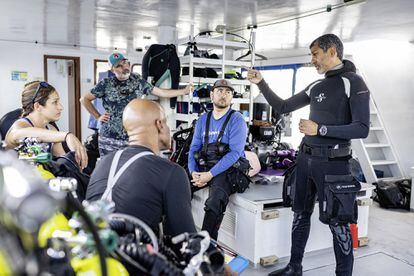He is not afraid that many people will follow him.
The depths to which Luiz Rocha dives are not for everyone.
But he has prepared himself all his life to access places where he discovers the never seen.
And this is how this Brazilian ichthyologist has already cataloged 32 marine species and has another 10 in the process of being approved by international organizations.
He does not believe that anyone has access to that underworld of the oceans, simply for two reasons: it is very expensive and you have to prepare hard.
“Each dive costs $10,000.
It takes 10 or 15 minutes to go down, but to get back up to the surface you need between six and seven hours.
All this to access more than 150 meters deep and stay there for no more than seven minutes.
This is how Rocha has discovered its unknown species.
This is why he has received his Rolex Award for Initiative this year, an award that will provide him with funds for three expeditions in the Maldives.
The call for these awards for the next edition is now open.
For four decades they have been distributed throughout the world to support various research and field work projects, generally aimed at improving the environment, conditions of poverty and inequality, or carrying out scientific experiments in adverse conditions.
There have already been 155 that have been distributed since it began its journey in 1976.
Rocha diving in search of new species.Franck Gazzola (Rolex) (©Rolex/Franck Gazzola)
The award has given Rocha funds for three expeditions to the Maldives, a place that has been little explored at the moment.
“I know the Philippines better, that is where we have managed to go further down and where we have discovered more species.
But the Maldives now seems to me something like the El Dorado of underwater species.”
He has been doing it since the end of the nineties and has already captained more than 70 expeditions.
He started in Brazil, where he received a bachelor's degree in Biology before earning a Ph.D. from the University of Florida and working at San Francisco State or becoming a member of the California Academy of Sciences.
He wanted to follow in the footsteps of Jacques Cousteau.
“It was my obsession.
As a child I took care of the aquarium at home, at school I paid attention to experiments with fish.
In my city there was not much interest in diving.
But I got into a school where I ended up being a teacher,” he recalls.
Along the coasts of his State, Paraíba, he also began to become aware.
The corals were in danger and he understood that he had to mobilize to protect them.
Thus arose a vocation that has dragged him all over the world, from the Caribbean to the Pacific, the Atlantic or the Indian Ocean, today with precision equipment and outputs whose average cost can be around 30,000 euros.
Ruiz Rocha and his team before a dive.
Franck Gazzola (Rolex) (©Rolex/Franck Gazzola)
They prepare each step carefully: “When we go down, we divide the tasks.
One is dedicated to collecting species, others to taking photographs.
It's a short time and we need maximum concentration”.
Then they analyze the captures.
“For the new species to be catalogued, we must follow a protocol.
First, the taxonomy, determining if each species feeds on others or on plankton.
Then we put a name, then we publish in a scientific magazine or journal”.
It is a process whose duration is variable: “Some have taken us months, others 20 years”.
All within a risky activity.
Not only for their lives, but also for those who decide to finance it: "It is because they must understand that either you can return with a few species or, if things go wrong, none."
Exclusive content for subscribers
read without limits
subscribe
I'm already a subscriber





